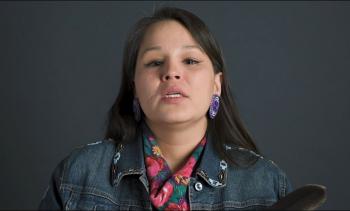Image Caption
Summary
Local Journalism Initiative Reporter
Windspeaker.com
The Anishinabek Nation has launched a virtual documentary program to help reduce the stigma that surrounds the HIV/AIDS virus.
“When we look at HIV as a whole it’s the stigma that is the killer. It leaves people voiceless and in gaps,” said Krista Shore, an advocate for people with HIV originally from the Peepeekeesis First Nation in Saskatchewan.
Last week, the Anishinabek Nation, made up of 39 First Nations throughout Ontario, held the virtual premiere of Shore’s short film as part of the Anishinabek Nation’s HIV Anti-Stigma Campaign.
“Being a youth that was diagnosed (with HIV) at the age of 24 years old, I had to face the shame of the illness right off,” Shore said in her documentary titled Love Everyone.
“Why did I feel so dirty? Why did I feel so low of myself?”
Shore’s video talked about how she felt about the lack of understanding and education within her community when she was first diagnosed, which led to some strained relationships, including with an Elder (though they ultimately reconciled).
“Along this journey it hasn’t all been strong, and sunshine and great teachings,” she said.
Shore closed out her documentary with thoughts of hope.
“We need to be surrounded by love, and healing hands, and helping hands.”
Tuesday, Dec. 1 marks World AIDS Day, and two more short documentaries will premiere premiere over Zoom, with the session starting at 2 p.m. eastern time. The documentaries will then be published on the Anishinabek Nation’s YouTube channel, available here.
All of the films were compiled by the Anishinabek Nation’s HIV Coordinator Laura Liberty and director Ed Regan.
Liberty spoke about some of the challenges facing people living with HIV.
“It’s the fear and the gossip. It’s the loss of friendship, family, the lack of respect, being treated like an unwanted disease,” she said.
“Feeling not wanted or loved or understood can prevent an individual from reaching out for help, getting tested and receiving medications that can manage the illness.”
Regan spoke about some of the benefits of launching the campaign virtually, including less resources spent on travel and a wider reach across the Anishinabek Nation’s 65,000-person population.
“I think a nice advantage of this type of media is to educate people with the click of a button,” Regan said. “This is a real efficient way of managing and teaching people.”
As well, Regan touched on the traumatic nature of these stories, saying that repeated telling of personal experiences can be ‘exhausting’ people.
“Hopefully, [this campaign] can create the change that’s much needed.”
While Shore’s piece focused on her own journey living with HIV, other background subjects related to Indigenous history were explored by Elders as part of the campaign.
Mary Elliott provided a short history of Indigenous populations within Canada in A Snapshot of our Story. Elliott described first contact with Europeans and the period of “lost spirituality, the introduction of residential schools and the impact of various pieces of legislation, such as the Indian Act.
“(Indigenous populations) lost that right to understand who they are or live by their traditions and customs,” Elliot said. Canada “wanted to remove the Indian out of us.”
June Commanda was featured in documentary called A Survivor’s Story. She spoke about her first day at Spanish Indian Residential School in Spanish, Ont. “I remember with such clarity right to this day,” Commanda said.
Tuesday’s premiere will see the launch of: When They Know with Carol Jones and Live. Love. Laugh. with Dawn Cameron.
World AIDS Day was designated in 1988 and was the first globally recognized health day. An estimated 38 million people worldwide are currently living with the HIV virus.
Outside of the documentary work, the Anishinabek Nation also offers other health resources and services for HIV, Hepatitis C, and other Sexually Transmitted Blood Borne Infections (STBBI).

